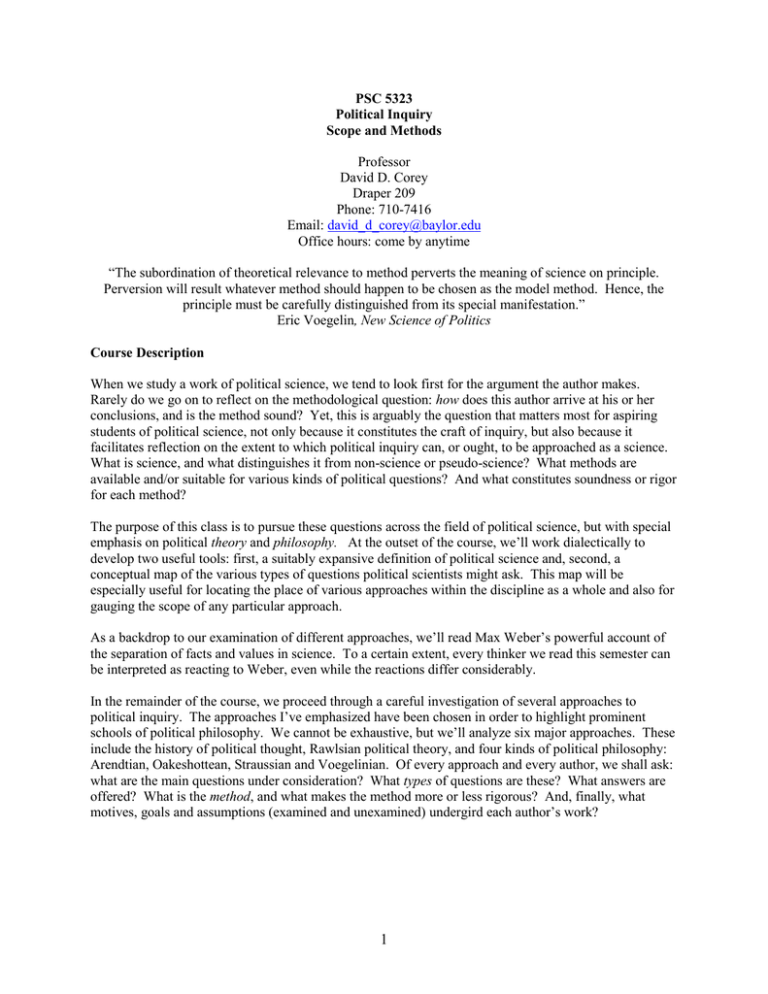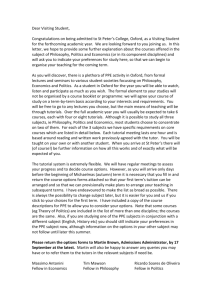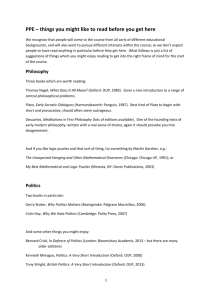How To Do Political Philosophy: Scope & Methods
advertisement

PSC 5323 Political Inquiry Scope and Methods Professor David D. Corey Draper 209 Phone: 710-7416 Email: david_d_corey@baylor.edu Office hours: come by anytime “The subordination of theoretical relevance to method perverts the meaning of science on principle. Perversion will result whatever method should happen to be chosen as the model method. Hence, the principle must be carefully distinguished from its special manifestation.” Eric Voegelin, New Science of Politics Course Description When we study a work of political science, we tend to look first for the argument the author makes. Rarely do we go on to reflect on the methodological question: how does this author arrive at his or her conclusions, and is the method sound? Yet, this is arguably the question that matters most for aspiring students of political science, not only because it constitutes the craft of inquiry, but also because it facilitates reflection on the extent to which political inquiry can, or ought, to be approached as a science. What is science, and what distinguishes it from non-science or pseudo-science? What methods are available and/or suitable for various kinds of political questions? And what constitutes soundness or rigor for each method? The purpose of this class is to pursue these questions across the field of political science, but with special emphasis on political theory and philosophy. At the outset of the course, we’ll work dialectically to develop two useful tools: first, a suitably expansive definition of political science and, second, a conceptual map of the various types of questions political scientists might ask. This map will be especially useful for locating the place of various approaches within the discipline as a whole and also for gauging the scope of any particular approach. As a backdrop to our examination of different approaches, we’ll read Max Weber’s powerful account of the separation of facts and values in science. To a certain extent, every thinker we read this semester can be interpreted as reacting to Weber, even while the reactions differ considerably. In the remainder of the course, we proceed through a careful investigation of several approaches to political inquiry. The approaches I’ve emphasized have been chosen in order to highlight prominent schools of political philosophy. We cannot be exhaustive, but we’ll analyze six major approaches. These include the history of political thought, Rawlsian political theory, and four kinds of political philosophy: Arendtian, Oakeshottean, Straussian and Voegelinian. Of every approach and every author, we shall ask: what are the main questions under consideration? What types of questions are these? What answers are offered? What is the method, and what makes the method more or less rigorous? And, finally, what motives, goals and assumptions (examined and unexamined) undergird each author’s work? 1 Goals To gain an overview of the discipline and to better understand how various approaches relate to each other and to political science as a whole. To become methodologically conscious—that is, to learn to appreciate methodological rigor and genius, and to demand these not only from others but also from ourselves. To learn which methods are suitable for different questions in political science and to learn what constitutes rigor according to each method. To better socialize ourselves into the discipline by understanding what political scientists are doing and why. This is not incompatible with criticism of certain approaches—indeed it is a precondition of intelligent criticism. To consider the types of political theory and/or philosophy we want, personally, to practice. To improve our scholarship not only by paying greater attention to method, but also by learning to distinguish between method of inquiry on the one hand and method of presentation on the other, or in other words, between science and rhetoric. To prepare for comprehensive exams by discussing major works of twentieth-century political thought. Required Texts R.G. Collingwood, Autobiography Michael Oakeshott, Rationalism in Politics and Other Essays Michael Oakeshott, On Human Conduct Eric Voegelin, Autobiographical Reflections Eric Voegelin, Science, Politics and Gnosticism Leo Strauss, Natural Right and History Hannah Arendt, The Human Condition John Rawls, Justice as Fairness: A Restatement Course requirements Paper 1 (7 pages.) 25%. See the end of the syllabus for paper suggestions Paper 2 (7 pages.) 30% Final Paper (10-20 pages) 35% Participation 10% Grade Scale: 0-59=F; 60-69=D; 70-79=C; 80-82=B-; 83-86=B; 87-89=B+; 90-92=A-; 93-100=A 2 COURSE CALENDAR T 1/14 Class Introduction: Frederick Wilhelmsen, “The Great Books: Enemies of Wisdom,” Modern Age (Summer/Fall 1987): 323–31; R. G. Collingwood, Autobiography chapters 1-5. TOWARDS A DEFINITION OF POLITICAL SCIENCE Th 1/16 Robert Goodin and Hans-Dieter Klingemann, “Political Science: The Discipline,” in A New Handbook of Political Science (Oxford: Oxford University Press, 1998), ch. 1. Gabriel Almond, “Political Science: The History of the Discipline,” in Ibid., ch. 2. Brian Barry, “Political Theory, Old and New,” in Ibid., ch. 23. T 1/21 Bhikhu Parekh, “Political Theory: Traditions in Political Philosophy,” in Ibid., ch. 21. Leo Strauss, “An Epilogue” in Herbert J. Storing, Essays on the Scientific Study of Politics (New York: Holt, Rinehart and Winston, 1962). Ross Corbett, “Political Theory within Political Science,” PS (2011): 565-70. FACT/VALUE DICHOTOMY Th 1/23 Max Weber, “The Meaning of ‘Ethical Neutrality’ in Sociology and Economics,” in Edward Shils and Henry Finch, eds. Max Weber on the Methodology of the Social Sciences (Glencoe: The Free Press, 1949), pp. 1-47. T 1/28 Eric Voegelin, New Science of Politics, “Introduction”; and Leo Strauss, Natural Right and History, ch. 2. QUENTIN SKINNER Th 1/30 Quentin Skinner, “The Limits of Historical Explanations,” Philosophy 41 (1966): 199215. T 2/4 Quentin Skinner, “Meaning and Understanding in the History of Ideas,” History and Theory 8 (1969): 3-53; Quentin Skinner, “Motives, Intentions and the Interpretation of Texts,” New Literary History 3, On Interpretation: I (1972): 393-408. JOHN RAWLS Th 2/6 Justice as Fairness, ed. Erin Kelly (Cambridge: Harvard University Press, 2001), pp. 138. T 2/11 Th 2/13 T 2/18 Th 2/20 JF, pp. 39-79; Allan Bloom, “Justice: John Rawls versus the Tradition of Political Philosophy,” American Political Science Review 69 (1975): 648-662; reprinted in Giants and Dwarfs; JF, pp. 80-115 JF, pp. 115-179. JF, pp. 180-202. HANNAH ARENDT T 2/25 Hannah Arendt, “Philosophy and Politics: What is Political Philosophy?” a course offered at the New School in spring 1969, from the papers of Hannah Arendt at the Library of Congress. Th 2/27 The Human Condition (Chicago: University of Chicago Press, 1958), Part I. T 3/4 HC, Parts II and III (selections) Th 3/6 HC, Part IV 3 spring break T 3/18 HC, Part V and VI (selections) MICHAEL OAKESHOTT Th 3/20 “Political Philosophy,” in Religion, Politics and the Moral Life (New Haven: Yale University Press, 1993). T 3/25 Th 3/27 T 4/1 On Human Conduct (Oxford: Oxford University Press, 1975), Chapter 1; “Rationalism in Politics” in Rationalism in Politics and Other Essays (Indianapolis: Liberty Fund, 1992). OHC. Chapter 2. OHC, Chapter 3. LEO STRAUSS Th 4/3 Strauss, “What is Political Philosophy?” Catherine Zuckert, “The Straussian Approach” in George Klosko, ed., Oxford Handbook of the History of Political Philosophy (Oxford: Oxford University Press, 2011) pp. 24-35. T 4/8 Natural Right & History (Chicago: University of Chicago Press: 1953), Introduction and ch. 1 Easter Break T 4/15 Th 4/17 T 4/22 NRH. ch. 3 and 4. NRH, ch. 5. NRH. ch. 6. ERIC VOEGELIN Th 4/24 Voegelin, “Reason: The Classic Experience” (Southern Review, 1974). T 4/29 Voegelin, Autobiographical Reflections (1/2); and half of Voegelin, Science Politics & Gnosticism (Washington, DC: Regnery Gateway, 1968). Th 5/1 Voegelin, Science, Politics and Gnosticism. A Word About the Papers Though I am happy to offer specific suggestions for paper topics, I would also encourage you to think up your own. My one requirement is that the papers be about method. Natural topics, therefore, would focus on such questions as the following: What is political philosophy [or theory] for John Rawls [or whichever author you wish to address]? Similarly: How does Hannah Arendt [or whomever] do political philosophy? Or: How does so-&-so’s approach to political philosophy stand in relation to Max Weber’s insistence on the separation between facts and values. I am not going to make specific deadlines for the papers. You should stagger them in such a way that you are not overburdened at the end of the semester. Certainly, both of the smaller papers should be finished by April 24, when we turn the final corner of the course. 4







